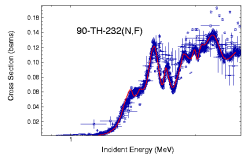
|
IAEA Databases: ENDF | EXFOR | RIPL-3 || PREPRO | ENDVER | ENDF utilities || Livechart | NSR | ENSDF | |
|
|
Test casesFive test cases are included in the empire/test-cases directory in order to test EMPIRE installation and to provide a brief introduction to the use of the code. They illustrate basic features only and do not address variety of possible options. These are relatively simple and fast calculations and only most relevant outputs are provided. All test cases are given as EMPIRE input files (files ending in .inp) in the empire/test-cases directory. Such files are ready to be run by whichever method the user may choose (through GUI or from command line using scripts). Basic output files, corresponding to EMPIRE runs of the aforementioned inputs, are also given in the empire/test-cases directory as reference. Such reference files are of the form *-ref.*. There is a script in the empire/scripts directory (named runtests) which runs sequentially all test-cases provided in the test-cases directory, keeping only basic outputs. This script is intended as a tool for comparing obtained outputs with those given as reference files. Also provided is a script (empire/scripts/cleantests) that cleans all the current outputs and prepares for a following run of EMPIRE. BenchmarksSeveral benchmark cases (input and output files) are provided in the empire/benchmarks directory. These are intended for regular testing of the code during development to ensure that no unwanted side-effects are introduced. Therefore, these cases consist mostly of single-energy calculations, which try to cover various combinations of options. They should not be considered as examples of real inputs to be used in evaluation or reaction calculations. Corresponding basic output files (*-ref.*) are provided in the empire/benchmarks directory as reference. The directory empire/scripts contains two additional scripts runbench and cleanbench to run and compare benchmark inputs with respective reference. The former script runs sequentially all the benchmarks, keeping only basic output, while the latter cleans previous runs preparing for the following one. Web: Michal Herman |

